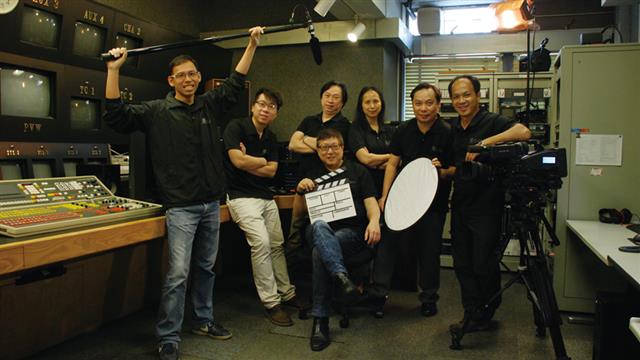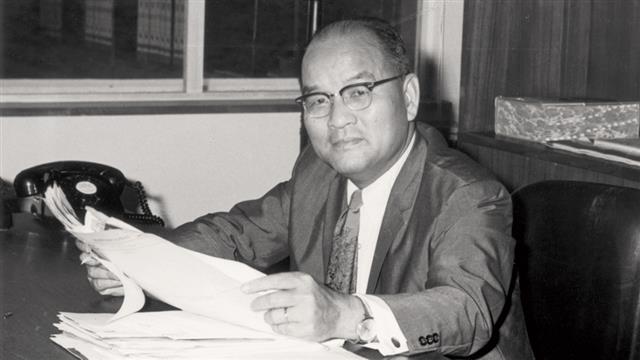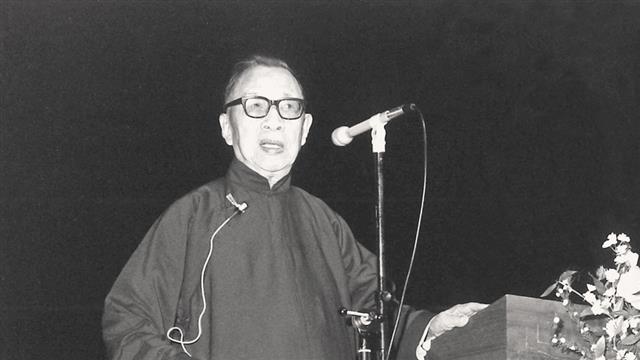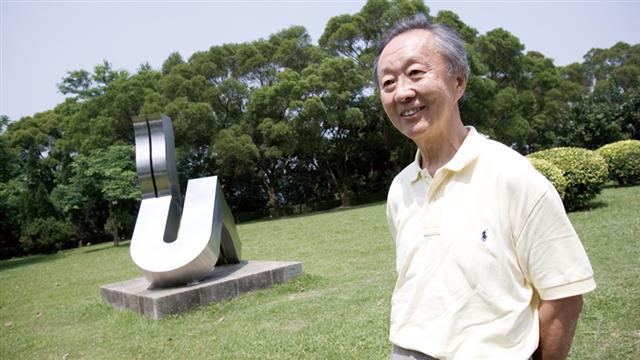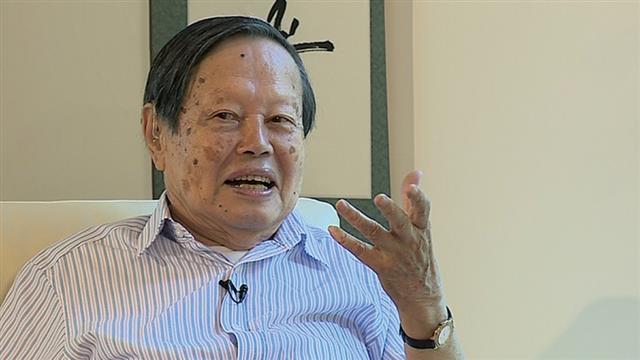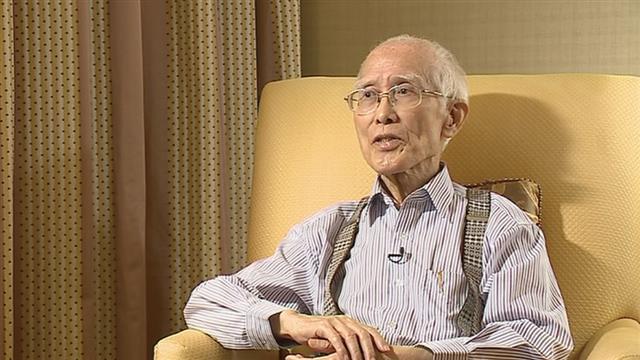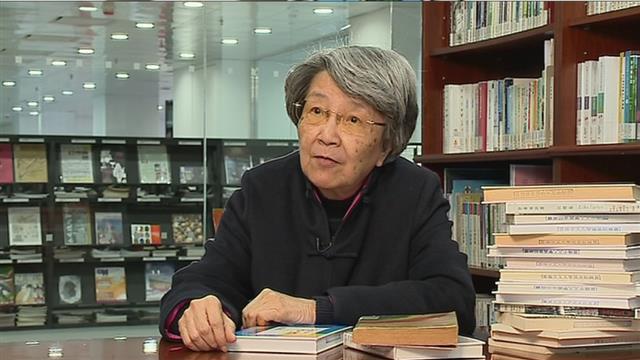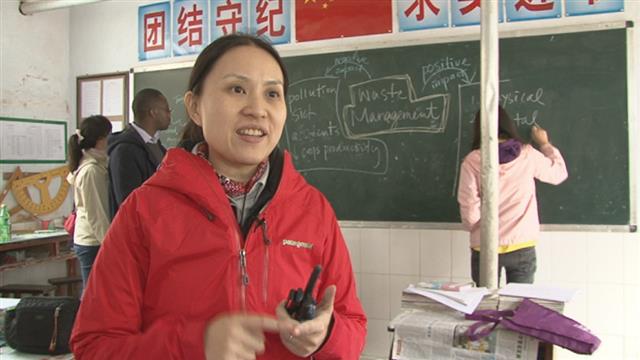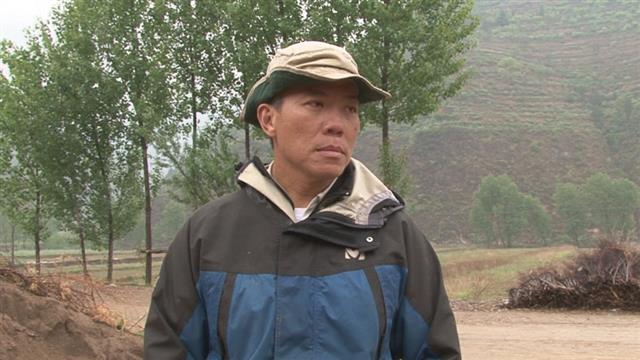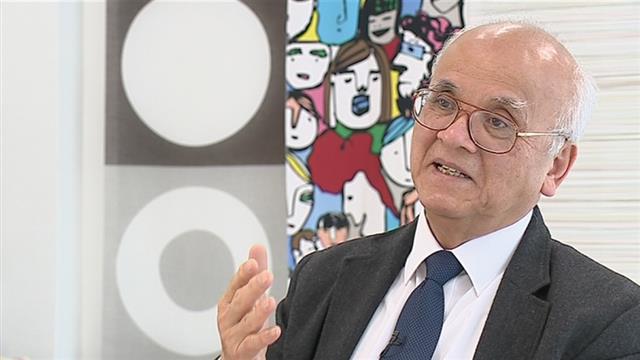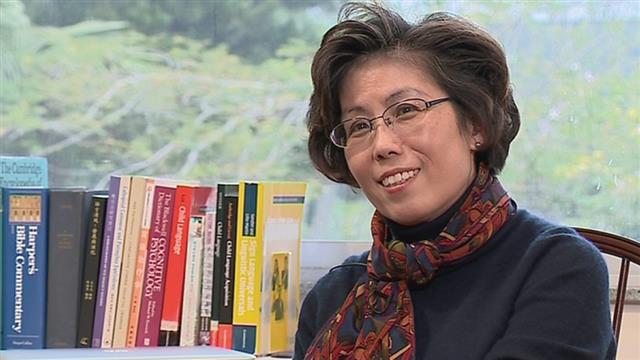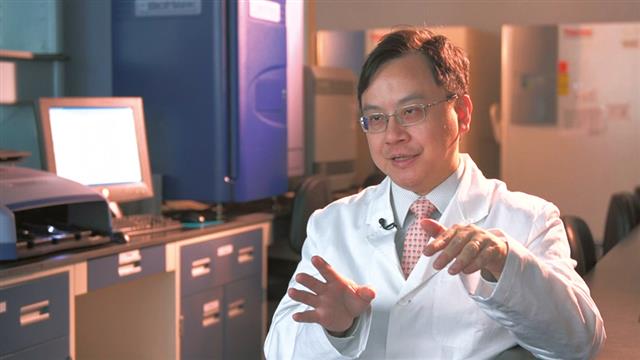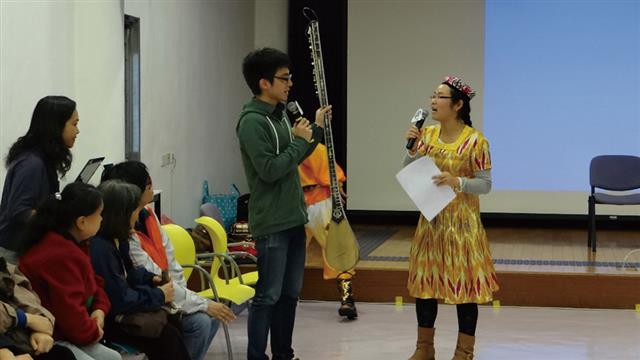The 'CU50‧The People' series, produced by the Audio-Visual Division of the Communications and Public Relations Office, presents what has made CUHK uniquely CUHK through the words and deeds of men and women who have left indelible marks on the University. Ms Amy Tsui, Director of Communications and Public Relations, talked about the origin of the series: 'The Chinese University celebrated its golden jubilee last year. We hoped that this series would bring to people from both within and outside the University a comprehensive view of the CUHK legacy and its spirit.' So far a total of 12 episodes have come out.
Each episode is under 10 minutes, but took two to three months to produce. Mr. Horace Tam, executive producer of the Audio-Visual Division, said that the mastermind behind each episode is the producer, who writes the script, goes through the files and shoots. After filming, great care is taken to select scenes and conversations for the best desired effect before post-production.
Another producer, Mr. To Shun-kei stressed the importance of pre-production research: 'For example, to shoot the Li Choh-ming episode, we re-read the early history of CUHK with special attention to the personal characteristics of Dr. Li. We then thought of whom to interview that would bring out the most distinctive side of him.'
Eleven episodes, each devoted to a representative figure of the University, can perhaps be divided into three subseries: those of the Founding Fathers, the Maestros and the Scholars in Society. The first subseries include: Dr. Ch'ien Mu, the founding president of New Asia College which was amalgamated with Chung Chi College and United College in 1963 to become The Chinese University of Hong Kong; Dr. Li Choh-ming, CUHK's founding Vice-Chancellor whose educational ideals have since guided the development of the University; and Prof. Charles K. Kao, father of optical fibre, former Vice-Chancellor and Nobel laureate. One finds a fair amount of old photographs, black-and-white footages and rare but precious voice recordings of Dr. Ch'ien and Dr. Li. Some of the stories of the early days of CUHK may be familiar, but to see and hear them re-told by people who had actually studied or worked with these founding figures is an impactful experience.
Friends, former colleagues and students share tidbits of fond remembrances. Controversies are not whitewashed. For example, Dr. Li's resistance to the government's proposal to standardize the normative curriculum to three years is underscored. The camera also does not shy away from Professor Kao's senility in recent years. His whistling and childlike antics may be viewed with mixed feelings among his friends and former colleagues and students. But, more importantly, his illness serves to arouse greater awareness of this increasingly commonplace disease.
The Maestros subseries comprises Prof. Yang Chen-ning, celebrated Nobel physicist; Professor Yu Kwang-chung, probably the most renowned Chinese poet living today; and Prof. Lo Wai-luen (Xiao Si). It is both pleasant and poignant to see in an episode Professor Yang as a young scientist taking part in CUHK affairs and a nonagenarian still involved with and caring for CUHK. In Prof. Yu's episode, some of the shots and scenes integrate very well with excerpts from the poet's works from the so-called 'Shatin Period'. The mist, the pine tree, the hills all bask in feelings and poetic resonances, showing great understanding and sensitivity on the part of the producer. On the other hand, one doesn't have to be heroic to be a hero, as Xiao Si exemplifies. Her personality comes through vividly on the screen, and viewers simply cannot help but respect her dedication to her teaching career and to the project of building a Hong Kong literary archive.
Other CUHK scholars have made their presence felt, not only because of their scholarly achievements but also their magnanimity which has touched and benefitted many. The last subseries features Prof. Emily Chan, Prof. Dennis Y.M. Lo, Prof. Edward Y.Y. Ng, Prof. Samuel S.M. Sun and Prof. Gladys Tang, whose respective achievements and accolades need no repeating. Professor Lo recalls how he had a research breakthrough when he was watching a Harry Porter movie in 3D with his wife. When the letter H, which looks like two chromosomes linked in the middle, flew at him he suddenly realized that a foetus's genomic map might be reconstructed from those of its parents'. Such is the power of the moving image! One is also given fair glimpses into the life of a College Master in Professor Sun's episode showing a party with students held at the Master's Lodge. All these scholars use their expertise to benefit the poor, the sick and the underprivileged, fine examples of the traditional Chinese scholar who studies in order to serve society. It is little wonder that in addition to their professional recognitions, Professor Chan, Professor Ng and Professor Tang have been bestowed with humanitarian awards.
The sights and sounds have preserved for posterity what CUHK once was, how it got to where it is now and where it is heading. Although the footprints of these impressive personalities are unmistakable, it is the spirit of their legacy that is the subject of this project. Prof. Edward Ng captured it very well when he said, 'The future of Wu Zhi Qiao lies in the hands of the young, not mine. When these young people forget the person and remember only the mission behind it, it will mean success for Wu Zhi Qiao.' The 12th in the series is not about any single individual but about different groups of CUHK students who volunteered their services in some of the remotest and most forsaken parts of the world.
Ms. Amy Tsui recalled the encouraging feedback they received from the visitors: 'Some alumni were greatly moved after viewing. To be able to understand their teachers better from such a human angle makes them even prouder of being part of CUHK.'
At the end of the Li Choh-ming episode, the narrator addresses and reassures the late Dr. Li that we will always remember and continue his contribution to CUHK, his embrace of Chinese culture and his passion for higher education in Hong Kong. These recordings in sounds and images are letters to subsequent generations of CUHK members who would be part of the same enterprise in the next 50 years and beyond.


